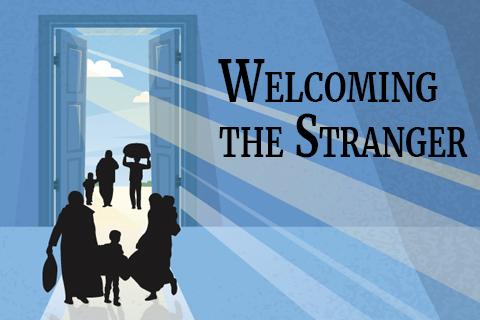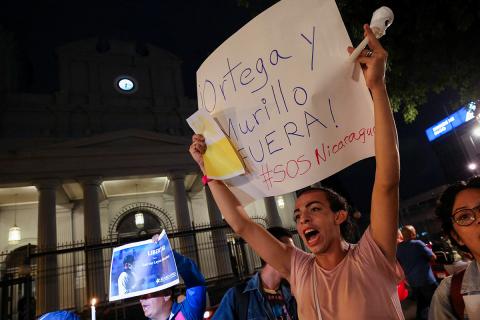
During Lent, a woman prays during the Stations of the Cross at the Metropolitan Cathedral of Managua, Nicaragua, March 17, 2023. Amid tensions between the Vatican and Daniel Ortega's government, Catholics held the devotional in the gardens of the cathedral due to the police prohibition on celebrating religious festivities in the streets. (AP/Inti Ocon)
Editor's note: Global Sisters Report's new series, "Welcoming the Stranger," takes a closer look at women religious working with immigrants and migrants. While we cover this topic often, this series will feature sisters and organizations networking to better serve those crossing borders, global migration trends and the topic of immigration in the upcoming U.S. presidential election.

About a year ago, while reporting on immigration in early April 2023, I came across a sister who was feeding, clothing and helping migrants and refugees passing through the outskirts of San Jose, Costa Rica.
"I understand them," she told me. "I have lived it. We have lived it, this situation of being exiled, in the flesh, as they say. It's painful."
Months earlier, she, along with other sisters from her congregation, had been expelled from neighboring Nicaragua, her homeland. At that moment, like some of those people she was helping, she was a woman without a country — one of 260,000 Nicaraguans, over 4% of the population, that the organization Human Rights Watch estimates left the country between 2018 and 2022.
But she didn't choose to leave. She was forced.
Sisters in Nicaragua have been forced by the government to leave their ministries, an exile that has deprived people in poverty the support the sisters used to provide, amid the instability of democratic institutions.
Women religious haven't been spared the suffering the Catholic Church is going through in Nicaragua, said a sister I met with in January while visiting El Salvador. At a moment's notice, she'd had to prepare to welcome a group of nuns forced to leave their ministry behind in Nicaragua.
The sisters already had been planning to leave, but their departure was hastened following a visit by government officials. The officials told them they could take whatever they wanted, but because the sisters were leaving by bus, they could only take what they could carry. Each grabbed clothes and a statue of a saint from the convent, and left.
In the summer of 2023, I began keeping a spreadsheet of congregations of sisters expelled from Nicaragua. By that count, almost two dozen women religious that I knew of, then, publicly told of their departure. Some communities explicitly said they had been told to leave, while one cited a lack of vocations as the reason; one congregation simply announced the community was leaving. But after July 2023, the public announcements stopped.
It was hard to read that silence.
Like the sisters, many Nicaraguans have found themselves with no choice but to leave.

A Nicaraguan exiled in Costa Rica holds a sign that says. "Out with Ortega and Murillo! #SOSNicaragua," during the Faith and Freedom Vigil in front of the Metropolitan Cathedral of San José, Costa Rica, Aug. 19, 2022, to protest against the detention of Matagalpa Bishop Rolando Álvarez by Nicaraguan authorities. (OSV News/Reuters/Mayela López)
Nicaragua, in a sense, is becoming our hemisphere's "Hermit Kingdom," a reference in our world usually reserved for North Korea, with few inside willing to talk and where it's getting harder by the day to get information out.
Until early January, it had been three months since I'd last spoken to someone inside. But days before my January visit to El Salvador, a Nicaraguan friend — a friar who had recently visited his family there — told me we could meet. Over coffee, he painted a picture of a Nicaragua where people are trying to live a "normal life," even though they know there's government surveillance.
He said he went to a Mass that was full, traffic was normal, people were going to the movies and to dance, all while knowing that "there's vigilance, there's a control by the state ... but it's not a country in mourning."
He said he was surprised to see a long line of people lined up to buy cars, likely an effect of those who have left the country and now are sending money home.
By contrast, when he visited in 2018, it looked like "after a hurricane," following protests and a government crackdown. These days, protests are subtle, he said.
You can still see bullet holes outside a church where government forces killed and injured protesters that turbulent year. They won't fill in the holes, not because they can't, he said, but because they won't. They want people to think about what happened there, he said.
Life has changed, however. The church now operates mostly indoors and people are careful about what they say, even after they leave. There's a sense that things aren't going to change for a long time, he said.
I later came across several Salvadoran Catholics who have been helping women as well as men religious and students from Nicaragua's Catholic universities, who are trickling out of the country, putting them up for a few days until they figure out whether to stay or go elsewhere.
The exodus, even if we don't hear about it, hasn't stopped.
But few are talking about their departure publicly these days, making it difficult to know the extent of expulsions of women and men religious, whether they were forced out or left voluntarily, and who and what is left behind.
Women religious haven't been spared the suffering the Catholic Church is going through in Nicaragua.
Like the sisters, many Nicaraguans have found themselves with no choice but to leave. And as a Nicaraguan communication student I met Jan. 29 at the Jesuit-run University of Central America in San Salvador told me, it happens before you know it.
"All of the sudden, I'm walking and then it hits me: What am I doing here? How did I end up here?" he said, after telling me how he made the decision to leave Nicaragua after his university, part of a network of institutions the Jesuits operate in Central America, shut down from one day to the next.
In August, the Nicaraguan government confiscated the university and its records, firing the staff and banning the Jesuits. Other universities in the network, including the one in El Salvador, have been scrambling to accommodate students and staff from Nicaragua.
"That question continues: What am I doing here?" the student said. "Why does someone have the right to take your things, out of nowhere, to ruin your life, in a certain way?"
Advertisement
It's a question that echoes the sentiments of the Nicaraguan sister in exile in Costa Rica. For her, the most painful part was not leaving the building where her congregation helped so many of Nicaragua's poor, but leaving people behind, worried about who would help them in their absence.
It became a worry that grew worse after a conversation she had with officials as she told them of those worries.
"They told us, 'That is not our problem,'" she said. "But yes, it's their problem. It's their people."
Months after her departure, she still hadn't forgotten them. She also hadn't forgotten the pain of being forced out, she said.
"It is very painful to leave your homeland."
This blog was originally published in Spanish Feb. 29, 2024.






